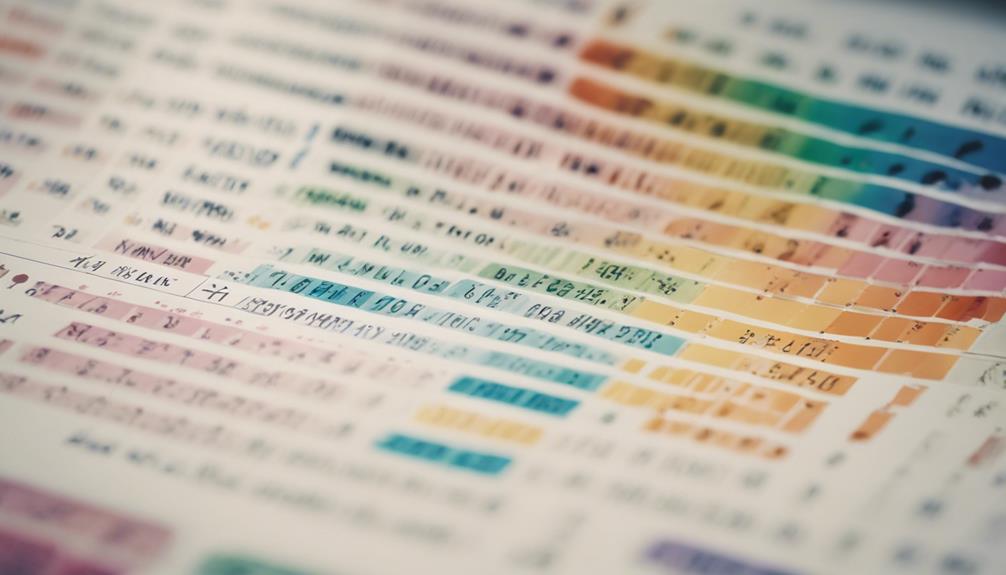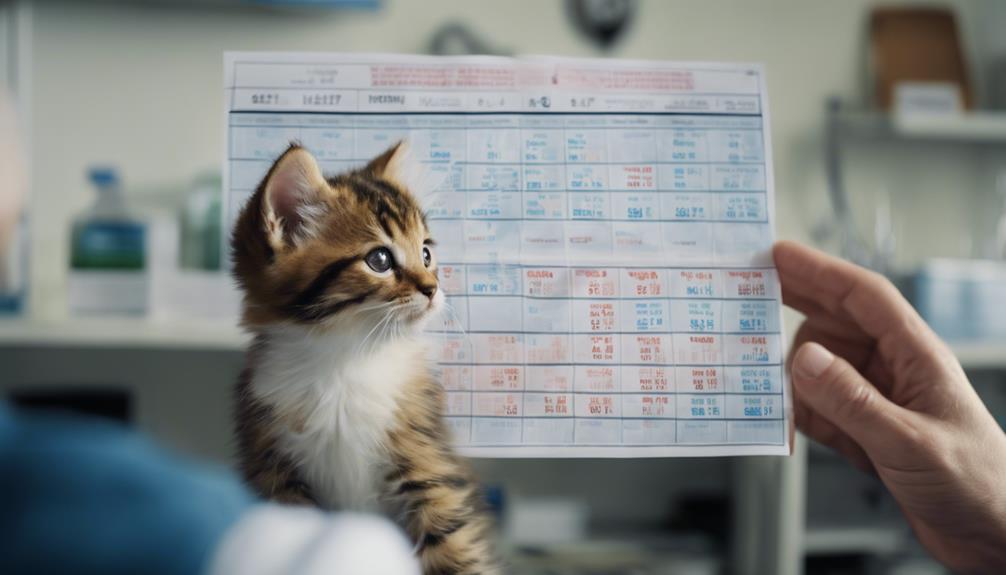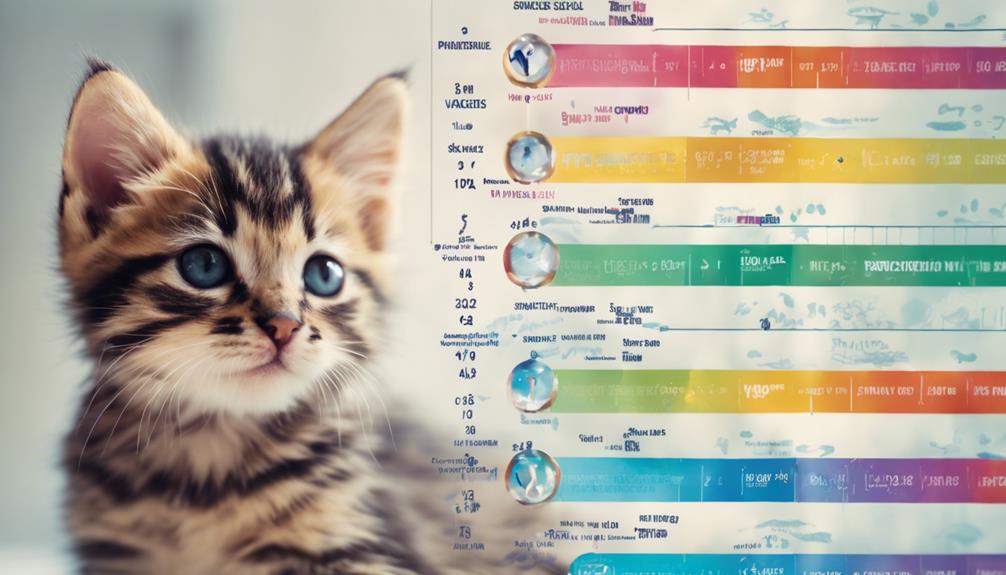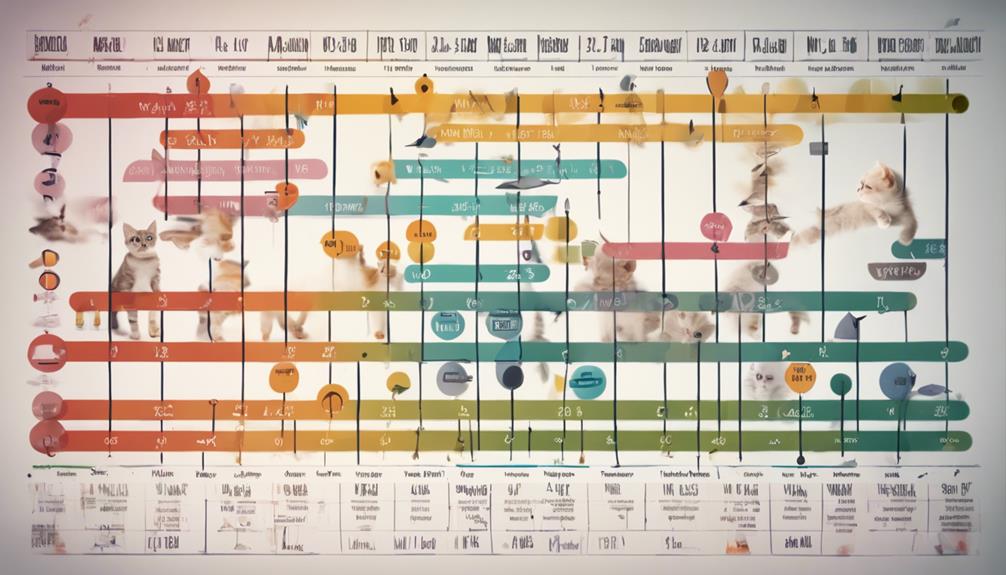In the realm of feline healthcare, establishing a clear and structured vaccination schedule for first-year kittens is a fundamental pillar in ensuring their long-term health and immunity. The adherence to a meticulously crafted vaccination chart not only shields young feline companions from a host of potential diseases but also contributes to the broader community's well-being.
By understanding the nuances of primary vaccines and booster doses, pet owners can play a proactive role in safeguarding their kitten's vitality. This article lays the groundwork for comprehending the essential aspects of a first-year kitten vaccination schedule, emphasizing the importance of tailored approaches and vigilant veterinary oversight in maintaining optimal health outcomes.
Key Takeaways
- Initial vaccination series in the first year is vital for comprehensive protection against feline diseases.
- Booster shots are essential to strengthen the immune response and extend disease protection.
- Veterinarians customize vaccination plans for kittens based on age, health, and lifestyle factors.
- Staying updated with essential vaccines safeguards kitten health, well-being, and prevents disease spread.
Importance of Kitten Vaccinations
Vaccinations are indispensable for safeguarding the health and well-being of kittens, ensuring protection against a range of potentially life-threatening diseases. By administering timely vaccinations, kittens are shielded from serious illnesses and complications that could arise without proper immunization.
These vaccines play a vital role in developing a robust immune system in kittens, helping them fight off infections and diseases effectively. Additionally, vaccinations not only protect individual kittens but also contribute to the broader community's health by preventing the spread of contagious diseases.
Thus, prioritizing kitten vaccinations is essential for promoting overall well-being, longevity, and quality of life for these young feline companions.
Essential Vaccines for Kittens
When considering the health of young feline companions, prioritizing the administration of essential vaccines is paramount. Ensuring that kittens receive the necessary vaccinations is crucial for safeguarding their well-being and longevity. The following are essential vaccines that every kitten should receive:
- Feline viral rhinotracheitis
- Calicivirus
- Panleukopenia
- Rabies
- Feline leukemia
These vaccines protect kittens from highly contagious and potentially fatal diseases, providing them with a strong immune defense against common threats. By staying up to date with these essential vaccinations, pet owners can significantly reduce the risk of their kittens falling ill and promote a healthier, happier life for their feline friends.
Initial Vaccination Series Overview

As essential vaccines lay the foundation for a kitten's health, the initial vaccination series serves as a crucial step in providing comprehensive protection against common feline diseases. This primary series typically consists of multiple shots given over several weeks to build up immunity effectively. Below is a simplified overview of the initial vaccination series schedule:
| Vaccine Type | Timing | Number of Shots |
|---|---|---|
| Feline Viral Rhinotracheitis | 6-8 weeks old | 1 (initial dose) |
| Calicivirus | 6-8 weeks old | 1 (initial dose) |
| Panleukopenia | 6-8 weeks old | 1 (initial dose) |
| Rabies | 12-16 weeks old | 1 (initial dose) |
Understanding Booster Shot Necessity
Booster shots play a vital role in maintaining a kitten's long-term immunity against prevalent feline diseases.
- Boosters strengthen the kitten's immune response
- They help extend the duration of protection
- Essential for combating waning immunity over time
- Aid in preventing disease resurgence
- Regular booster shots are recommended by veterinarians
Veterinarian's Role in Vaccination Schedule

Understanding the optimal timing and administration of kitten vaccinations is a crucial aspect of preventive healthcare for feline companions. Veterinarians play a pivotal role in ensuring the efficacy and safety of the vaccination schedule.
Veterinarians are trained professionals who assess each kitten's individual needs, taking into account factors such as age, health status, and potential exposure risks to tailor a vaccination plan that provides the necessary protection. They guide pet owners on the appropriate timing of initial vaccinations and booster shots, ensuring that the kitten develops a robust immune response.
Veterinarians also monitor for any adverse reactions and provide prompt medical attention if needed. Their expertise is instrumental in safeguarding the health and well-being of kittens through a comprehensive vaccination program.
Tailored Vaccination Schedules for Kittens
Tailoring vaccination schedules for kittens involves customizing the timing and types of vaccinations based on individual feline health profiles and potential exposure risks. This personalized approach ensures that each kitten receives the necessary protection at the right time, optimizing their immune response and overall health.
When creating tailored vaccination schedules for kittens, considerations may include:
- Age and developmental stage of the kitten
- Health history and current medical conditions
- Lifestyle factors such as indoor versus outdoor living
- Geographic location and prevalence of specific diseases
- Risk of exposure to other animals or environments
Monitoring Kitten Health Post-Vaccination

Following kitten vaccinations, diligent monitoring of their health is crucial to ensure their well-being and detect any potential adverse reactions promptly. Keep a close eye on your kitten for the first 24-48 hours post-vaccination for any signs of discomfort, such as lethargy, loss of appetite, or localized swelling.
Monitor their behavior, eating habits, and litter box usage. If your kitten displays severe symptoms like difficulty breathing, vomiting, or diarrhea, contact your veterinarian immediately. Additionally, observe the injection site for any unusual redness, swelling, or discharge.
Regularly check your kitten's temperature and keep them hydrated. Prompt attention to any abnormal signs post-vaccination can help in ensuring your kitten's continued health and well-being.
Recognizing Common Vaccine Side Effects
After monitoring your kitten's health post-vaccination, it is important to be vigilant in recognizing common vaccine side effects to ensure their continued well-being.
- Mild reactions like swelling at the injection site are common
- Symptoms may include lethargy or decreased appetite
- Severe reactions are rare but should be reported to the vet
- Contact the veterinarian if concerned about any side effects
- Monitor for signs of allergic reactions such as difficulty breathing or swelling of the face
Being aware of these potential side effects will help you provide the necessary care and attention to your kitten following vaccinations.
Addressing Mild Reactions in Kittens

When kittens experience mild reactions to vaccinations, prompt attention and appropriate care are essential to ensure their well-being and comfort. Common mild reactions may include swelling at the injection site, slight lethargy, or a temporary decrease in appetite.
It is important for kitten owners to monitor their pets closely after vaccination and provide a calm and quiet environment for recovery. Offering extra comfort, such as a cozy bed and gentle reassurance, can help alleviate any discomfort your kitten may be experiencing.
If symptoms persist or worsen, consulting with a veterinarian is recommended to address any concerns and ensure the well-being of your furry companion. Remember, most mild reactions resolve on their own with time and proper care.
Dealing With Severe Vaccine Reactions
Addressing mild reactions in kittens is crucial for their well-being, but when faced with severe vaccine reactions, prompt and appropriate actions are vital to ensure the safety and health of your furry companion. In the event of severe vaccine reactions, here are some important steps to take:
- Contact your veterinarian immediately
- Follow any emergency instructions provided by your vet
- Monitor your kitten closely for any changes in behavior
- Provide a calm and comfortable environment for your kitten
- Keep all relevant vaccination records and information handy for the vet
Utilizing Resources for Tracking Vaccinations
Efficiently tracking kitten vaccinations is essential for ensuring timely and comprehensive protection against diseases. Utilizing resources such as printable schedule charts can aid in keeping track of shots and their timing. These charts are designed for easy reference, providing a clear outline of the vaccination schedule tailored specifically for kittens. By following these schedules diligently, pet owners can ensure that their kittens receive the necessary vaccinations at the appropriate intervals, ultimately leading to optimal protection against common diseases.
Similar to tracking vaccination schedules for human babies, monitoring and documenting kitten vaccinations are vital for maintaining their health and well-being. These resources serve as valuable tools in ensuring that kittens receive the required immunizations for a healthy and happy life.
Frequently Asked Questions
Can Kittens Receive Vaccinations if They Are Sick or Have a Weakened Immune System?
Kittens should not receive vaccinations if they are sick or have a weakened immune system. Vaccines may not be effective and could potentially worsen their condition. Wait until they are healthy before administering vaccinations to ensure proper protection.
Are There Any Alternative Vaccination Options Available for Kittens Who May Have Allergic Reactions to Traditional Vaccines?
Alternative vaccination options may be considered for kittens with allergic reactions to traditional vaccines. Consult with a veterinarian to explore potential alternatives like hypoallergenic vaccines or desensitization protocols. Individualized care plans tailored to the kitten's specific needs are recommended.
How Do Environmental Factors, Such as Living in a Multi-Pet Household or Outdoor Exposure, Impact a Kitten's Vaccination Schedule?
Environmental factors, like multi-pet households or outdoor exposure, can impact a kitten's vaccination schedule. These factors may necessitate additional vaccinations or different timing to ensure comprehensive protection. Consulting with a veterinarian for tailored recommendations is crucial.
Are There Specific Considerations or Precautions to Take When Vaccinating Kittens From Different Breeds or Genetic Backgrounds?
When vaccinating kittens from different breeds or genetic backgrounds, it's vital to consider variations in immune responses. Tailored vaccination schedules may be needed based on individual health factors. Consult with a veterinarian for personalized recommendations to ensure optimal protection.
What Steps Can Be Taken to Ensure That Kittens Who Have Missed Their Initial Vaccination Series Catch up on Their Shots Effectively?
To ensure kittens who missed initial vaccinations catch up effectively, consult a veterinarian. They will assess the kitten's health, recommend an adjusted vaccination schedule, administer necessary shots, and monitor for any adverse reactions. Regular follow-ups are crucial for complete protection.
How Does Kitten Feeding Schedule Affect Their Vaccination Schedule?
Planning a proper kitten feeding schedule: yearlong guide can greatly impact their vaccination schedule. Ensuring they receive adequate nutrition at specific times can help boost their immune system, making vaccinations more effective. A well-fed kitten is more likely to handle vaccinations with ease, reducing the risk of adverse reactions.
Conclusion
In conclusion, adherence to a structured first-year kitten vaccination schedule is essential in safeguarding the health and well-being of young feline companions.
By understanding the importance of primary vaccinations and booster doses, pet owners can contribute to the long-term health and longevity of their kittens.
With diligent veterinary oversight and awareness of common vaccine side effects, pet owners can make informed decisions to protect their cherished companions from a range of debilitating diseases.




